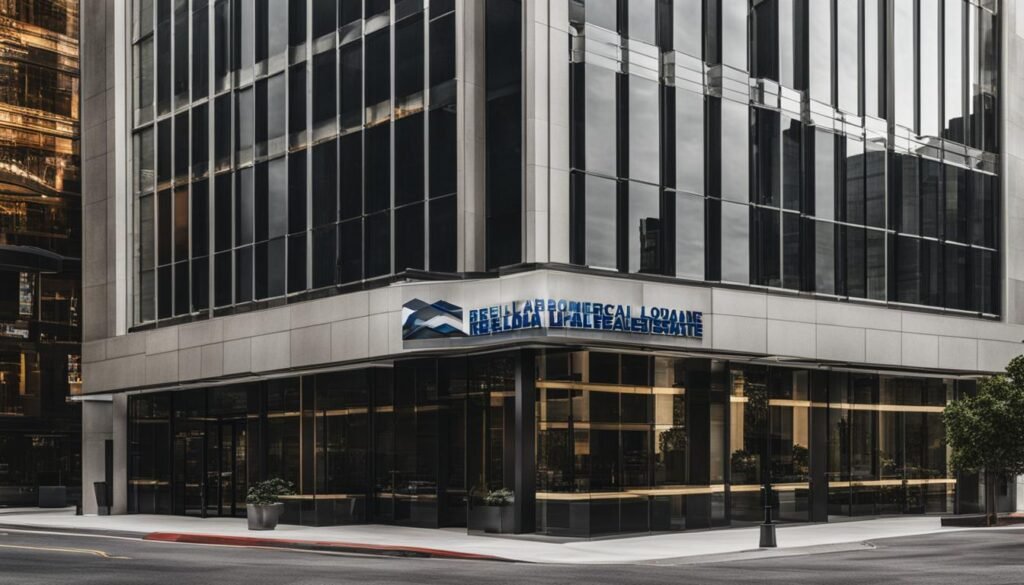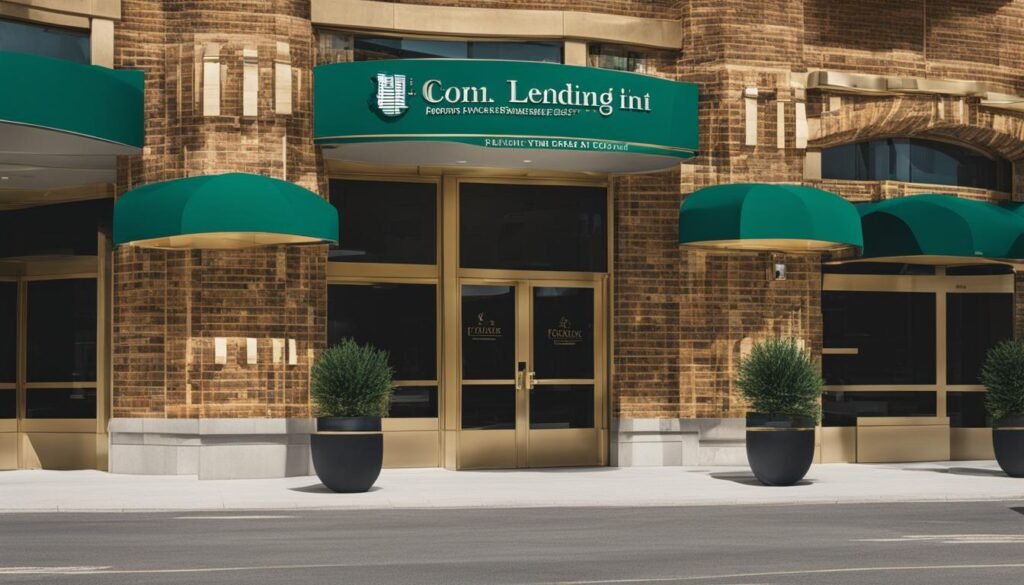A commercial loan serves as a vital financial tool for businesses, providing them with the capital needed to invest in growth, cover operational expenses, and seize new opportunities. But what exactly is a commercial loan and how does it work?
A commercial loan can be defined as a debt-based funding arrangement between a business and a financial institution, typically a bank. It allows businesses to access funds they may not be able to afford upfront, enabling them to meet their financial objectives.
These loans are not typically used for personal purposes but rather tailored specifically for businesses. To obtain a commercial loan, businesses must meet certain requirements, including providing collateral and financial statements to demonstrate their ability to repay the loan.
Key Takeaways:
- A commercial loan is a debt-based funding arrangement between a business and a financial institution.
- It is used by businesses to fund major capital expenditures and cover operational costs.
- Collateral and financial statements are typically required to secure a commercial loan.
- Commercial loans allow businesses to access funds they may not be able to afford upfront.
- These loans are tailored specifically for businesses and different types of commercial loans serve different purposes.
How Commercial Loans Work
Commercial loans are a crucial financial tool for businesses, providing the funds needed to support short-term operational costs and purchase essential equipment. This section provides a detailed overview of the commercial loan process and application requirements.
Types of Commercial Loans
Commercial loans can be structured as business term loans or lines of credit, depending on the specific needs of the business. Business term loans are a common option, providing a lump sum of funds that businesses can use for various purposes, such as financing projects or expansion plans. On the other hand, lines of credit offer more flexibility, allowing businesses to access funds as needed and only pay interest on the amount used.
Collateral and Cash Flows
When applying for a commercial loan, collateral is often required to secure the loan. This collateral can be in the form of assets owned by the business or cash flows from future accounts receivable. By providing collateral, businesses demonstrate their commitment to repaying the loan, giving the lender a sense of security.
Documentation and Application Process
To apply for a commercial loan, businesses need to provide various documents that demonstrate their financial stability and ability to repay the loan. These may include balance sheets, income statements, and cash flow statements. Additionally, lenders may require insurance on any purchased items.
The application process itself can vary depending on the lender and the specific loan program. It typically involves submitting the necessary documentation, completing the application form, and waiting for approval. The approval time can range from a few days to several weeks, depending on the complexity of the loan and the lender’s internal processes.
Commercial Loan Application Requirements
| Required Documents | Description |
|---|---|
| Financial statements (balance sheets, income statements, cash flow statements) | These statements provide an overview of the business’s financial health and ability to generate revenue. They are essential for assessing the business’s creditworthiness. |
| Insurance on purchased items | Lenders may require insurance coverage on any equipment or property purchased using the commercial loan. This helps protect the lender’s investment. |
| Business plan | A well-structured business plan outlines the goals, objectives, and strategies of the business. It showcases the business’s potential for success and helps lenders determine its viability. |
By fulfilling all the necessary requirements and providing the required documentation, businesses increase their chances of securing a commercial loan to support their growth and operational needs.
Types of Commercial Loans

Commercial loans come in various forms to cater to different business needs. Whether you require funding for real estate ventures, equipment purchases, or short-term financing, there is a type of commercial loan that can suit your specific requirements. Let’s explore some of the common types of commercial loans:
- Mini-Perm Loans for Commercial Real Estate: These loans are designed for commercial real estate projects and provide financing during the construction or development phase. They offer flexibility with repayment terms and typically have a duration of three to five years.
- Renewable Loans for Ongoing Operations: These loans are suitable for businesses that require continuous funding for their day-to-day operations. They provide a revolving line of credit that can be accessed on an ongoing basis.
- Equipment Financing Loans: Businesses that need to purchase specialized equipment can opt for equipment financing loans. These loans enable businesses to acquire the necessary equipment while spreading out the cost over time.
- Commercial Auto Loans: If your business requires vehicles for transportation or delivery purposes, commercial auto loans can be a suitable option. These loans provide financing to purchase commercial vehicles and offer customized repayment terms.
- Commercial Bridge Loans: Designed for short-term financing, commercial bridge loans help businesses bridge the gap between transactions or financing. These loans are commonly used in commercial real estate to facilitate quick transactions while waiting for long-term financing.
Understanding the different types of commercial loans available can help businesses make informed decisions when seeking financial support. By choosing the right type of loan, businesses can secure the necessary funds to drive growth and achieve their goals.
How to Get a Commercial Loan

When it comes to obtaining a commercial loan, businesses have several options to choose from. The key is to identify the right lender and navigate the application process effectively. Here’s a step-by-step guide on how to get a commercial loan:
- Determine the type of financing needed: Before applying for a commercial loan, businesses should have a clear understanding of their funding requirements. Whether it’s for expanding operations, purchasing equipment, or managing cash flow, knowing the specific financing need will help in selecting the right loan product.
- Evaluate eligibility: Lenders assess a business’s creditworthiness and stability to determine loan eligibility. Factors such as credit score, time in business, revenue, and financial statements are considered. It’s crucial for businesses to review their financials and ensure they meet the lender’s requirements.
- Research lenders: Different lenders offer commercial loans with varying terms, interest rates, and requirements. It’s essential to research and compare lenders to find the one that best suits the business’s needs. This can involve reviewing online lenders, traditional banks, credit unions, and other lending institutions.
- Prepare the required documents: Commercial loan applications generally require specific documentation to support the application. Common documents include bank statements, tax returns, financial statements, business plan, and legal documents. Having these documents ready in advance can streamline the application process.
- Apply for the loan: Once the necessary documents are gathered, it’s time to submit the loan application. Businesses need to provide accurate information and fill out the application form completely. Some lenders may also require a personal guarantee or collateral.
- Wait for approval: The approval process for a commercial loan can vary depending on the lender and the complexity of the application. It’s important to be patient during this stage and be prepared for potential follow-up questions or requests for additional information from the lender.
- Review the loan offer: If the loan application is approved, the lender will provide a loan offer outlining the terms and conditions of the loan. It’s crucial to carefully review the offer and understand all the terms, including the interest rate, repayment schedule, and any associated fees.
- Accept the loan offer: If the loan offer meets the business’s needs and aligns with its financial objectives, it can be accepted by signing the necessary documentation and returning it to the lender.
- Receive funding: After accepting the loan offer, the lender will initiate the funding process. The funds will be disbursed to the business’s designated account, allowing them to utilize the loan for their intended purpose.
Applying for a commercial loan requires careful consideration and thorough preparation. By following these steps and working with the right commercial lender, businesses can increase their chances of securing the financing they need to support their growth and operations.
Where to Get a Commercial Loan

When it comes to obtaining a commercial loan, businesses have several options to choose from. The choice of lender depends on factors such as cost, funding time, and business qualifications. Here are some common sources where businesses can secure a commercial loan:
- Banks and Credit Unions: Banks and credit unions are traditional lenders that offer commercial loans. They typically provide lower interest rates but have longer application processes. Businesses looking for competitive rates and personalized service may opt for these institutions.
- U.S. Small Business Administration (SBA): The SBA works with lenders to offer commercial loans to small businesses. SBA loans often come with favorable terms and rates, making them an attractive option for business owners seeking financial assistance.
- Online Lenders: Online lenders provide a quick and convenient way to access funds. These lenders offer faster approval processes but may have higher interest rates compared to traditional institutions. Business owners requiring immediate funding or with less-than-perfect credit may find online lenders to be a viable solution.
- Nonprofit Lenders: Nonprofit lenders are organizations that focus on supporting local communities. They offer a range of loan products tailored to meet the needs of small businesses. These lenders often prioritize community impact and provide flexible financing options.
Each lending option has its own advantages and disadvantages. It’s important for businesses to carefully consider their financial goals and choose a lender that aligns with their needs and capabilities.
Image:
Benefits of Commercial Loans

Commercial loans offer a range of advantages for businesses seeking financial support. These loans provide numerous benefits that can contribute to business growth and stability.
Separating Business and Personal Finances
One of the key benefits of commercial loans is the ability to separate business and personal finances. By obtaining a commercial loan, businesses can maintain distinct financial accounts and records, ensuring a clear separation between personal and business expenses. This not only simplifies accounting processes but also safeguards personal assets in the event of business liabilities or debts.
Building Business Credit
Commercial loans present an opportunity for businesses to build their credit profile. Timely payment of loan installments and meeting financial obligations can improve the creditworthiness of a business. Building a strong business credit history can open doors to better loan terms, higher credit limits, and increased funding opportunities in the future.
Access to Larger Loan Amounts
Commercial loans often provide access to higher loan amounts compared to other types of financing. This allows businesses to secure the necessary funds to meet various financial needs, such as expanding operations, purchasing equipment, refinancing existing debts, or managing cash flow. The larger loan amounts offered by commercial loans can support significant business investments and contribute to long-term growth.
Flexible Use for Various Business Purposes
Commercial loans offer flexibility in terms of their use. Businesses can utilize these loans for a wide range of purposes, including but not limited to:
- Expansion into new markets or locations
- Purchase of equipment or property
- Refinancing of existing debts
- Managing cash flow during fluctuating revenue cycles
The versatility of commercial loans ensures that businesses have the financial resources to address both immediate and long-term business needs.
“Commercial loans provide businesses with the necessary funds to support growth and meet various financial needs. They offer the advantages of separating business and personal finances, building business credit, and providing access to larger loan amounts.”
Potential Disadvantages of Commercial Loans

While commercial loans offer businesses access to funding for growth and operational needs, they also come with potential disadvantages and risks that should be considered. It’s important for businesses to weigh these factors before committing to a commercial loan.
1. Lengthy Application Process
Applying for a commercial loan can involve a complex and time-consuming application process. Lenders typically require extensive documentation, including financial statements, tax returns, and bank statements. This paperwork can take a significant amount of time and effort to gather, delaying the loan approval and funding process.
2. Paperwork Requirements
Commercial loans often require businesses to provide detailed financial information and documentation to prove their creditworthiness and ability to repay the loan. This level of paperwork can be cumbersome and may require the assistance of financial professionals to ensure accuracy and compliance.
3. Less Flexibility
Compared to alternative financing options, commercial loans may offer less flexibility in terms of repayment schedules, interest rates, and loan terms. Businesses may be limited in their ability to negotiate more favorable terms, resulting in potentially higher costs and less favorable loan conditions.
4. Risk of Default
There is always a risk of default with commercial loans. If a business fails to meet its repayment obligations, it can negatively impact its credit score and financial standing. Defaulting on a commercial loan can also result in the loss of collateral used to secure the loan, such as business assets or property.
“Businesses need to carefully consider the potential disadvantages of commercial loans and determine if the benefits outweigh the risks. It’s crucial to have a solid repayment plan and ensure that the loan will support the business’s long-term goals.”
Overall, commercial loans have the potential to provide businesses with the necessary capital to fuel growth and expansion. However, it is essential to carefully weigh the potential downsides, assess the business’s financial capabilities, and explore alternative financing options before committing to a commercial loan.
Ideal Business Uses for Commercial Loans

Commercial loans offer businesses the financial flexibility to support growth and meet various financial needs. These loans can be utilized in several strategic ways, including:
- Expanding into new markets: Use commercial loans to finance market expansion initiatives, such as opening new locations or entering new geographic regions. This can help businesses reach a wider customer base and increase revenue.
- Purchasing equipment or property: Commercial loans can be used to acquire necessary equipment or real estate assets for business operations. Whether it’s investing in updated machinery or buying commercial properties, these loans enable businesses to make large purchases without impacting their cash flow.
- Refinancing debt: Businesses can utilize commercial loans to consolidate existing debts and secure better interest rates or repayment terms. This allows for improved cash flow management and potential cost savings over time.
- Managing cash flow: Commercial loans can help businesses navigate temporary cash flow challenges. By securing additional working capital, businesses can bridge gaps between accounts receivable and accounts payable, ensuring smooth operations.
- Acquiring another business: Commercial loans are often used to fund mergers and acquisitions, allowing businesses to expand their market share and capitalize on synergies with other companies.
- Supporting inventory management: Commercial loans can provide the necessary funds for businesses to efficiently manage their inventory levels, ensuring they have sufficient stock to meet customer demand without tying up excessive capital.
No matter the specific purpose, commercial loans empower businesses to make key investments and strategic decisions, ultimately driving growth and success.
| Business Uses for Commercial Loans | Benefits |
|---|---|
| Expanding into new markets | Reach wider customer base, increase revenue |
| Purchasing equipment or property | Acquire necessary assets without impacting cash flow |
| Refinancing debt | Consolidate debts, secure better rates or terms |
| Managing cash flow | Bridge gaps between accounts receivable and payable |
| Acquiring another business | Expand market share, capitalize on synergies |
| Supporting inventory management | Efficiently manage inventory levels |
Commercial Lenders

When businesses need access to funding, there are various options available from different types of commercial lenders. These lenders include:
- Banks and Credit Unions: Traditional lenders like banks and credit unions offer commercial loans to businesses. They often have strict qualification requirements but provide lower interest rates and longer repayment terms.
- Online Lenders: Online lenders provide a convenient alternative for securing commercial loans. They offer quick approval processes and can be ideal for businesses in need of fast funding. However, interest rates may be higher compared to traditional lenders.
- Nonprofit Organizations: Nonprofit lenders focus on supporting local communities by providing commercial loans to businesses. They offer a range of loan products and can be a good option for businesses looking for lenders with a community-oriented approach.
- U.S. Small Business Administration (SBA): The SBA collaborates with lenders to offer commercial loans, including SBA loans. SBA loans are government-guaranteed loans that provide businesses with favorable terms and lower down payments. They are particularly beneficial for small businesses that may have difficulty securing traditional financing.
Comparison of Commercial Lenders
| Lender Type | Qualification Requirements | Interest Rates | Application Process |
|---|---|---|---|
| Banks and Credit Unions | Strict qualification criteria, including creditworthiness and financial stability | Lower interest rates | Lengthy application process involving extensive documentation |
| Online Lenders | Relaxed qualification requirements, often accepting lower credit scores | Higher interest rates | Quick and streamlined online application process |
| Nonprofit Organizations | Varies depending on the organization | Varies depending on the organization | Application process may involve working closely with the organization and providing additional supporting documents |
| U.S. Small Business Administration (SBA) | Requirements determined by the SBA and lender, including creditworthiness and ability to repay | Competitive interest rates | Involves working with an SBA-approved lender and providing required documentation |
Choosing the right commercial lender depends on factors such as the business’s financial profile, funding needs, and eligibility. Each type of lender offers different loan options and qualification requirements. Businesses should carefully evaluate their options and select the lender that best aligns with their specific needs and goals.
Types of Commercial Loans
Commercial loans come in various forms, catering to different business needs and financial situations. Understanding the different types of commercial loans available can help businesses make informed decisions when seeking financing.
1. Business Term Loans
A business term loan is a popular option for businesses looking for a lump sum of funds to finance specific projects or investments. These loans come with fixed interest rates and a predetermined repayment term. Business term loans are suitable for larger investments like equipment purchases, property expansion, or launching a new product line.
2. Business Lines of Credit
A business line of credit offers businesses flexibility in accessing funds as needed. It functions like a revolving credit account, allowing businesses to withdraw funds up to a predetermined credit limit. Interest is only charged on the amount borrowed, and businesses can repay and reuse the credit line multiple times. Business lines of credit are ideal for managing cash flow fluctuations and covering short-term operational expenses.
3. Cash Advances
Cash advances are a type of commercial loan that allows businesses to access funds based on their expected credit card sales. Businesses receive a lump sum upfront and repay the loan through a percentage of their daily credit card sales. This type of financing is popular in industries with high credit card transactions, such as retail or restaurants.
4. Business Credit Cards
Business credit cards provide a convenient way for businesses to manage day-to-day expenses. These cards function similarly to personal credit cards, allowing businesses to make purchases and pay them off over time. Business credit cards often come with rewards programs, such as cashback or travel rewards, providing additional benefits to businesses.
5. SBA Loans
The Small Business Administration (SBA) offers government-guaranteed loans to help businesses meet various financial needs. SBA loans have lower interest rates and longer repayment terms compared to traditional commercial loans. They can be used for purposes such as starting a business, purchasing real estate, or refinancing existing debt.
In summary, commercial loans come in various forms, each catering to specific business needs. Whether businesses require a fixed lump sum for a specific project, ongoing access to funds, or financing based on credit card sales, there are different types of commercial loans available to suit their requirements.
Vendor Credit

Vendor credit is a valuable resource for businesses looking to manage their cash flow and acquire necessary goods and services. With vendor credit, businesses can make purchases from specific vendors on credit, allowing them to access the products they need without upfront payment.
One of the key advantages of vendor credit is the extended payment terms it offers. Typically, vendors provide net-30 terms, which means businesses have 30 days to pay for their purchases. This grace period allows businesses to utilize the goods or services they need immediately while providing them with additional time to generate revenue or secure funds for payment.
Moreover, vendor credit serves as a form of working capital for businesses. By deferring payment, businesses can better manage their cash flow and allocate funds to other essential areas of their operations. This flexibility can be particularly beneficial for small businesses with limited financial resources or those experiencing seasonal fluctuations in revenue.
In addition to the immediate advantages, vendor credit can also contribute to building a strong business credit profile. Timely payments and responsible utilization can positively impact a business’s creditworthiness, making it easier to access other forms of financing in the future.
Overall, vendor credit provides businesses with a valuable tool for managing their cash flow and accessing necessary goods and services. By leveraging this form of credit, businesses can maintain financial stability while optimizing their operations for growth.
Key Benefits of Vendor Credit:
- Extended payment terms provide flexibility and help businesses manage cash flow
- Serves as working capital, allowing businesses to allocate funds to other operational needs
- Contributes to building a strong business credit profile
Conclusion
Commercial loans play a crucial role in providing businesses with the necessary funds for growth and various financial needs. These loans enable businesses to access capital for major purchases and cover operational costs that they may not be able to afford upfront. However, it’s important for businesses to carefully consider the benefits and potential disadvantages before pursuing a commercial loan.
Commercial loans offer several advantages, including the ability to separate business and personal finances, build business credit, and access larger loan amounts. They can be used for expanding into new markets, purchasing equipment or property, refinancing debt, managing cash flow, and even acquiring another business. These loans provide businesses with the necessary funds to support growth and meet their financial goals.
Despite the advantages, businesses need to be aware of the potential downsides of commercial loans. The application process can be lengthy, with a significant amount of paperwork required. Additionally, commercial loans may offer less flexibility compared to other types of financing. There is also a risk of default, which can have a negative impact on the business’s credit score and result in the loss of collateral.
Choosing the right type of commercial loan and lender is crucial for successful financing and business growth. Businesses should carefully evaluate their financing needs, consider the specific requirements and options of different types of commercial loans, and research different lenders. By taking these factors into account, businesses can make informed decisions and secure the funding they need to thrive.
Also Refer : Sell Your Car With A Loan: Quick & Easy Guide
FAQs
Q: What is a commercial loan?
A: A commercial loan is a financial product specifically designed for financing business needs, such as purchasing commercial real estate, covering operational expenses, or funding expansion projects.
Q: How does a commercial loan differ from a residential loan?
A: Unlike residential loans, which are meant for personal property, commercial loans are tailored for business purposes mortgage, often involving larger sums of money and different eligibility criteria.
Q: What are the typical interest rates for commercial loans?
A: Interest rates for commercial loans can vary based on factors such as the borrower’s creditworthiness, the loan term, and the current market conditions. It’s advisable to shop around and compare offers to secure a competitive rate.
Q: What are the alternatives to commercial loans?
A: Businesses seeking financing may explore alternatives to traditional commercial loans, such as lines of credit, equipment financing, or Small Business Administration (SBA) loans, to find a solution that best suits their needs.
Q: What are the key factors in the commercial loan repayment process?
A: Commercial loan repayment terms are influenced by various factors, including the loan amount, interest rate, and repayment schedule. It’s crucial for borrowers to plan their finances strategically to ensure timely repayments.
Q: What is the process for obtaining a commercial business loan?
A: The process for securing a commercial loan involves several steps, including application submission, documentation review, underwriting, and eventual funding. Working with a trusted lender can help streamline this process.
Q: What types of businesses are eligible for small business loans?
A: Various types of businesses, including startups, established enterprises, and even franchises, may be eligible for small business loans. Lenders assess factors such as credit history, revenue, and business plan when evaluating eligibility.
Q: How do real estate financing and commercial loans intersect?
A: Real estate financing often involves commercial loans, which are specifically aimed at funding the acquisition, development, or renovation of commercial properties. Understanding the intricacies of commercial real estate loans is crucial for those in the real estate market.
Q: What are the typical terms for a commercial loan?
A: Commercial loan terms can vary widely, but they typically include factors such as the loan amount, interest rate, repayment schedule, and any collateral requirements. Understanding these terms is essential for making informed borrowing decisions.
Q: How can a business secure a commercial loan for a commercial construction project?
A: Businesses seeking funding for commercial construction projects can explore commercial construction loans, which are specifically tailored for such endeavors. These loans may involve specific requirements and considerations, so it’s advisable to consult with lenders experienced in this area.
Source Links
- https://www.investopedia.com/terms/c/commercial-loan.asp
- https://www.nav.com/blog/commercial-loans-63451/
- https://www.nerdwallet.com/article/small-business/commercial-business-loans
